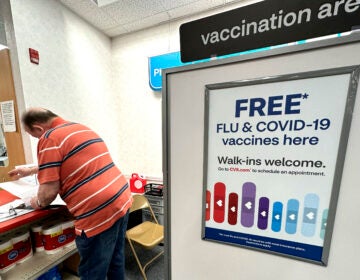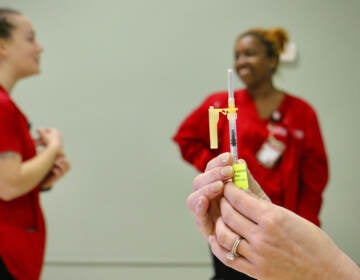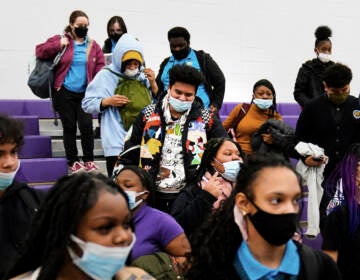Coronavirus update: N.J. requires face coverings at all retail stores
Gov. Phil Murphy also emphasized that families should not gather for the upcoming Passover, Easter and Ramadan holidays.
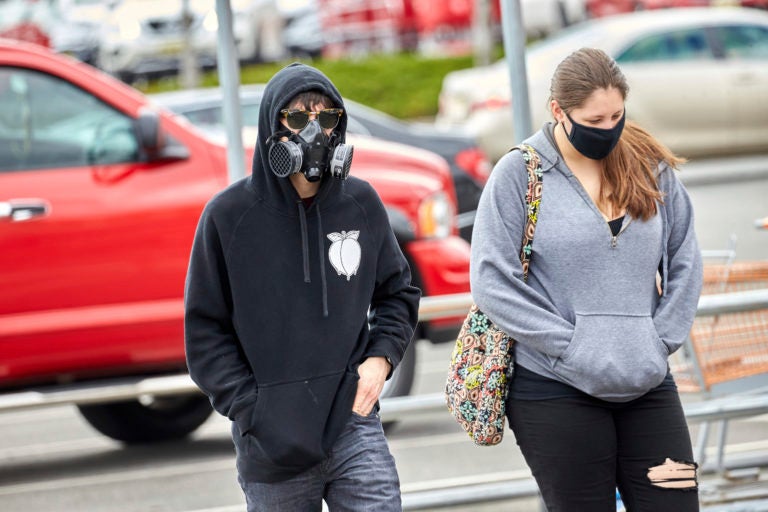
April 4, 2020, Scotch Plains, New Jersey, USA: Customer is ready for shopping wearing a top of the line protective mask at Home Depot during this covid-19 pandemic in Watchung, New Jersey. Duncan Williams/CSM.(Credit Image: © Duncan Williams/CSM via ZUMA Wire) (Cal Sport Media via AP Images)
Are you on the front lines of the coronavirus? Help us report on the pandemic.
Updated: 6:30 p.m.
New Jersey officials reported another 3,088 cases of coronavirus cases on Wednesday, with the state’s total now at 47,437.
Gov. Phil Murphy also said another 275 people have died, bringing the state’s total number of fatalities to 1,504.
Face coverings at all retail stores
In response to reports of overcrowding at grocery stores, Murphy on Wednesday said customers and employees alike must now wear masks or other face coverings at all retail businesses that remain open during the coronavirus pandemic.
Under an executive order issued Wednesday, the governor also said retail stores must limit occupancy to 50% of their approved capacity, provide designated hours for at-risk shoppers and erect barriers between customers and cashiers where possible.
“Ensuring social distancing may require you to change the times in which you go to the store, but that’s a small price to pay to ensure the health of your community,” he said at his daily coronavirus briefing.
The penalties for not wearing face coverings while shopping, however, do not appear to be very strict.
“If someone refuses to wear a mask when entering a supermarket for medical or other reasons, the supermarket is to allow them access to the store but they can limit their time or their proximity to other customers to keep everyone safe,” said Parimal Garg, the governor’s deputy chief counsel.
Murphy also halted all construction across the state as of 8 p.m. Friday with the exception of projects related to hospitals, schools, the transportation and utility sectors, affordable housing and other “essential” work. Emergency repairs and sites that can adhere to strict limits on the number of workers on site are also exempted, he said.
The new restrictions come a day after Murphy closed all state and county parks and remarked that he didn’t think there were many more social distancing mandates he could impose. He had already shuttered schools, shut down non-essential businesses, banned gatherings of any size and asked residents not to leave home unless it was truly necessary.
But Murphy made clear Wednesday that his administration is willing to impose ever more stringent restrictions to slow the spread of the virus and make sure hospitals do not become overwhelmed with patients.
‘We cannot gather together’ for Passover, Easter, Ramadan
Along those same lines, the governor also pleaded with residents not to gather for upcoming religious holidays. Passover begins this evening, Easter is Sunday, and Ramadan begins April 23.
“I cannot say this strongly enough: We cannot gather together,” Murphy said. “There cannot be large community Seders or gatherings either, by the way, indoors or outdoors. We will have to get creative to come together virtually so that we can gather together again someday soon in person.”
Murphy, who is Catholic, empathized with what a sacrifice it would be for families not to come together on these holidays. He said some of his fondest memories with his wife Tammy were at Seders alongside people of many different faiths.
But, he said, “we are in the fight of our lives” and social distancing remains paramount.
“The story of Passover is a story of strength and perseverance and ultimately deliverance,” he said. “So we must exhibit these traits today, throughout Passover and every day until this emergency ends.”
N.J. pushes back primary to July 7
New Jersey officially moved its primary to July 7, a delay of about five weeks from the previous date of June 2.
Murphy said the change preserves the possibility of in-person voting should the health situation in the state improve.
But if it doesn’t, the delay also gives officials more time to organize an entirely vote-by-mail election, which has never happened before in New Jersey, he said.
“I don’t want a Wisconsin and saw yesterday where people had to pick between exercising their right to vote on one hand and protecting their own personal health,” Murphy said. “That task becomes easier with an extra month of time.”
Top Murphy aide tests positive
Matt Platkin, the governor’s chief counsel, has tested positive for COVID-19, Murphy spokesman Mahen Gunaratna said Wednesday, while NJ Advance Media reported that another high-ranking administration official had been administered a test.
“[Platkin] is currently asymptomatic and has been in quarantine since last Saturday while continuing to actively work from home,” Gunaratna said, adding that both the governor’s office and the state’s emergency management hub in Ewing, known as the ROIC, have undergone deep cleans.
Murphy, 62, who is still recovering from a March 4 surgery to remove a cancerous tumor from his kidney, has not been tested, Gunaratna said.
Murphy arrived at his daily news briefing on Wednesday wearing a face mask emblazoned with “EXIT 109,” signifying the Garden State Parkway exit near his home in Middletown.
Murphy has said in recent weeks he has not felt symptoms of the virus.
North Jersey city to disperse crowds with drones
Police in Elizabeth said they will deploy five drones equipped with loudspeakers to break up gatherings and tell people to go home without having to interact with residents in person.
The social distancing-friendly enforcement technique was put to wide use in China — “Hey, handsome guy speaking on your mobile! Where is your mask,” one drone blares in a video distributed by Chinese state-run media — and has since spread to France, Spain and other countries.
“These drones will be around the city with an automated message from the Mayor telling you to STOP gathering, disperse and go home,” the Elizabeth Police Department said in a Facebook post. “Summonses HAVE AND WILL CONTINUE to be issued to those found in violation. Fines are up to $1,000.”
The type of drone acquired by the Union County department can also be used to spray disinfectants and check temperatures using infrared cameras, according to the company that supplied them.
But a city spokeswoman told NJ Advance Media that the devices would only be used to broadcast a recorded message.
“They will be used throughout the city, specifically in areas that may be difficult for a police car to access, to have people do social distance,” spokeswoman Kelly Martins told the outlet.
WHYY is your source for fact-based, in-depth journalism and information. As a nonprofit organization, we rely on financial support from readers like you. Please give today.


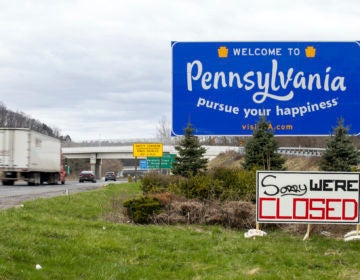
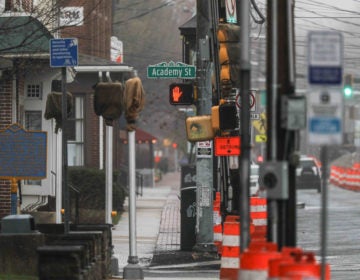
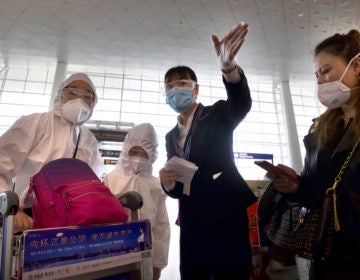
![CoronavirusPandemic_1024x512[1]](https://whyy.org/wp-content/uploads/2020/03/CoronavirusPandemic_1024x5121-300x150.jpg)
